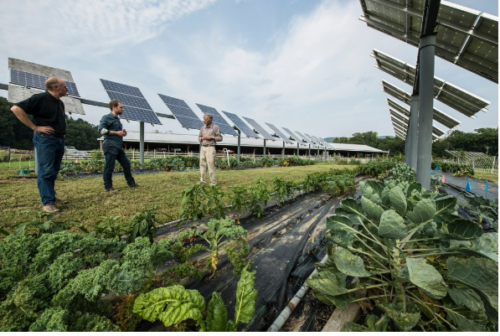Small-scale farmers, food processors or distributors, or farmers markets financially impacted by Covid-19 can now apply for up to $20,000 to recover costs related to the pandemic. The National Center for Appropriate Technology (NCAT) is helping food producers access these dollars through the USDA’s Pandemic Response and Safety Grant Program. Applications are now open until Nov. 22, 2021.
If you operate a small farm producing specialty crops whose annual revenue is less than $1 million, run a farmers market, food hub, community supported agriculture (CSA) farm, a small food processing business or food manufacturing operation, you may be eligible for grant funding.
According to the USDA, the pandemic-related costs that are recoverable through this grant program relate to the following areas, and include estimating staff time to implement:
- Workplace Safety: Implementing workplace safety measures to protect against COVID-19 such as providing personal protective equipment, thermometers, cleaning supplies, sanitizers, hand washing stations, installation and purchase of air filters or new signage.
- Market Pivots: Implementing market pivots to protect against COVID–19. Though not exactly well-defined market pivot are related to cost of changing how you had to operate your enterprise to make it more COVID-19 safe including the staff time to implement these changes. For example, a farmers’ market may have had to restructure their layout to ensure one-way traffic and improve social distancing.
- Retrofitting Facilities: Retrofitting facilities for worker and consumer safety to protect against COVID–19 such as installation and purchase of protective barriers, walk up windows, heat lamps/heaters, fans, tents, propane, weights, tables chairs and lighting.
- Transportation: Providing additional transportation options to maintain social distancing and worker and consumer safety to protect against COVID-19 such as securing additional transportation services for workers or establishing new delivery routed or distribution services. For instance, a food hub might have had to shift to delivering food directly to consumers rather than just having to have common distribution point.
- Worker Housing: Providing additional worker housing resources or services to maintain social distancing or to allow for quarantining of new or exposed employees.
- Medical: Providing health services to protect workers against COVID-19 including offering or enabling vaccinations, testing, or healthcare treatment of infected employees, including paid leave.
This is not a competitive grant program; grants will be awarded based on eligibility. Funding is not awarded on a first-come-first-serve basis, and the 45-day application period opened October 6.
Before applying, all applicants must obtain a Data Universal Number System (DUNS) number. This DUNS number will be required to receive this grant. More information on how to obtain a DUNS number, plus full eligibility criteria can be found at the USDA’s website: https://usda-prs.grantsolutions.gov/usda.
You can also ask further questions about this program by emailing usda.ams.prs@grantsolutions.gov or call 301-238-5550. NCAT’s ATTRA Sustainable Agriculture program will provide additional support related to accessing this new grant program. Check our website at ATTRA.NCAT.ORG or sign up for our weekly e-newsletter for updates.

 “National Farmers Market Week is a great time to bring attention to the bounty of locally grown products that can be purchased at farmers markets,” says Tammy Howard, Montana Farmers Market Network coordinator. “You can find a variety of products, including fruits, vegetables, baked goods, homemade jams and jellies, handmade soaps, beef, poultry, eggs, honey, and artisan crafts at farmers markets throughout the year in many communities.”
“National Farmers Market Week is a great time to bring attention to the bounty of locally grown products that can be purchased at farmers markets,” says Tammy Howard, Montana Farmers Market Network coordinator. “You can find a variety of products, including fruits, vegetables, baked goods, homemade jams and jellies, handmade soaps, beef, poultry, eggs, honey, and artisan crafts at farmers markets throughout the year in many communities.”